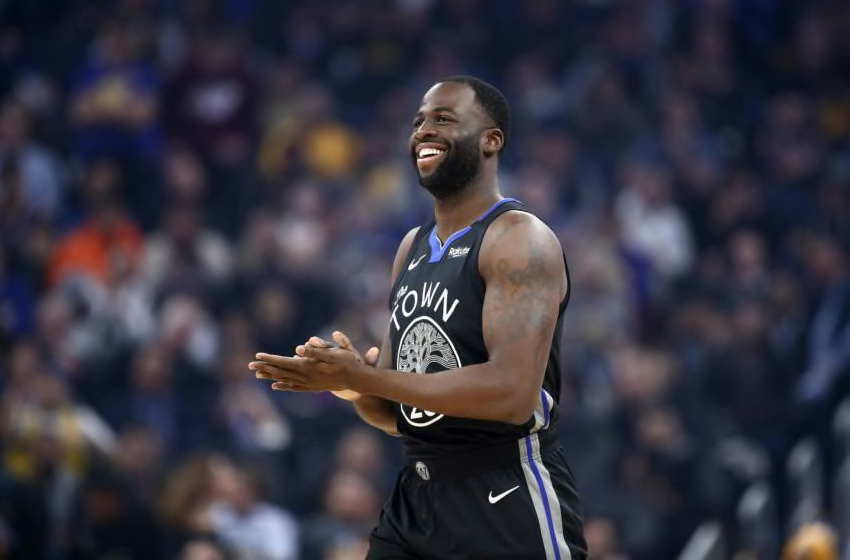
Draymond Green, #23, Golden State Warriors,(Photo by Ezra Shaw/Getty Images)
There is an idea out there that Draymond Green was exposed this season, struggling without his superstar teammates. It’s absurd.
Draymond Green is not a charming protagonist. His shooting numbers have been tenuous for a while now, but without the best of circumstances working in his favor — by name: Steph Curry, Kevin Durant and Klay Thompson — he’s having his least efficient and maybe his least effective season since his rookie year. The feature role isn’t a great fit for him and he prefers to delegate the shot-taking to others, even when those others aren’t the superstars he’s used to but instead Eric Paschall and Damion Lee and Ky Bowman. This season hasn’t been one of his best looks, and it leaves us wondering what next season’s follow-up with Curry and Klay back will be.
I’ve always wondered how history will remember Draymond Green. There’s the idea that the 2019-20 season exposed Draymond’s grift of his superstar teammates, and it doesn’t help that they’ve been making memes of the way he shoots a basketball for years. Because of the nature of his game, he’s always been tricky to compare with his peers. Guys like Curry will be fine under just about any team context, but it’s also true that his specific team context elevated him. Draymond is that team context, the connective tissue. He’s one of our generation’s great screen-setters, as well as one of its great short-roll passers in those common situations where multiple defenders scramble to Curry in the pick-and-roll.
Screen-setting and short-roll passes are mind-numbingly dull things to talk about and anyone who makes a habit of doing so is probably a narc, but it can be more simple than that: Count the rings! Like any NBA champion, the Warriors couldn’t have won a ring, much less three, with just a great offense or even with all-time great shooting. The 7SOL Phoenix Suns and Stan Van Gundy’s Orlando Magic initiated the sea change towards small ball, but Draymond took that shift to its logical conclusion as a do-it-all, know-it-all 5 who could switch screens, defend the rim, read ahead of plays and quarterback an elite team defense. Defense is a more collective effort than scoring, but Draymond makes a singular impact as one of the greatest defenders of all-time.
Draymond Green is the Golden State Warriors’ connective tissue
There might not be much glory in connective tissue, even though there can be championships. What gets me is that there might be more glory in chasing isolation stardom, even when the chase doesn’t yield actual superstardom. How does Draymond compare with ball-handler types who are (for now) limited alphas or maybe even secondary players, like Brandon Ingram, CJ McCollum or Zach LaVine? It isn’t just that Draymond’s praises go unsung — unsung heroes are a good bit more common than him — but that he’s actively diminished by a lot of the ways that we talk about the game.
Thanks to The Last Dance, there’s been a renewal in the conversation about what it means when a role player is a superstar. Dennis Rodman presents a great case study as one of the best defenders and rebounders of all-time, playing in a tertiary spotlight behind Michael Jordan and Scottie Pippen. He’s in the Hall of Fame. He probably wouldn’t fly as a solo act, either. (Rodman also seems to be a more well-liked protagonist than Draymond, probably on account of dressing and generally living like some badass fusion of Prince and Blade.)
Draymond’s career resume isn’t Rodman’s by any means, and it’s also incomplete, but when you ask people about Draymond and the Hall of Fame, you tend to get a full range of answers, most of them a referendum on whether a player like Draymond should or can get into the Hall of Fame at all. Arguing about the Hall of Fame usually gets tedious fast — in so many settings, those arguments are abstracted to the point of losing most of their meaning, and also, the Hall of Fame itself is just sort of boring — but the consensus is so far apart on Draymond, and that’s wild to me.
What’s clear is that so many teams have tried to find the next Draymond Green, and that they’ve mostly come up empty. Scouts have suggested Aaron Gordon, Julius Randle or Michael Kidd-Gilchrist; optimists have suggested Rondae Hollis-Jefferson or Justise Winslow; radicals are suggesting Ben Simmons. Nobody has had the same skills, the same size and speed, and most importantly, the same sense of role cohesion. Bam Adebayo might be getting there and P.J. Tucker can pass for a patchwork Draymond on a weird, almost desperate Houston Rockets team, but neither of them has reached or sustained Draymond’s highs. Draymond is just as rare as a true ball-handling alpha and maybe even rarer.
Next season is supposed to be the triumphant return of the Warriors, although there are some reasons to think that it won’t all go smoothly. Durant is gone, and so are pieces of their veteran depth such as Andre Iguodala and Shaun Livingston. In their place, a group of TBDs including Andrew Wiggins and a new generation of young and untested Warriors. Even more than that, the problem with expecting a return to the Warriors’ 2016 form is just that Curry, Klay and Draymond are all in their 30s now, and if I had to guess, age is going to hit Draymond the hardest.
I’ll be honest, I don’t have any particular interest in seeing the Warriors get another turn at the top anyway, but I would sure hate for next season to be in any way definitive of a referendum on a body of work that already stands for itself. Draymond Green doesn’t need a redemption season.